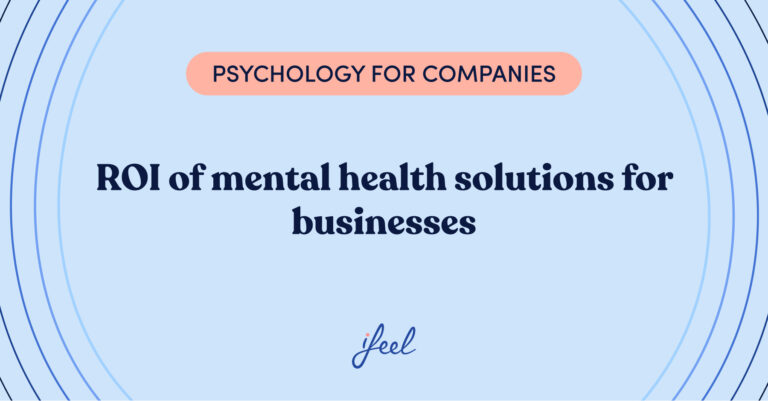In a world challenged by multiple threats, it is only natural that mental health and human resources should be a predictable pairing within the work ecosystem. All companies aspire – or should aspire – to work healthily, protecting the well-being of employees and differentiating themselves from their main competitors.
Therefore, mental health and human resources are two closely related topics since it is precisely those responsible for the Human Resources department who are in charge of leading strategies to care for the well-being of workers, including psychological well-being.
Mental health and human resources
Taking care of employees’ mental health from the Human Resources area has become one of the organsation’s main challenges. Responding successfully to this task can be done in different ways. However, since we are talking about people’s health, it is advisable to limit improvisation to a minimum and, on the contrary, to have a strategic vision that allows mental health and human resources to be a coherent and valuable equation within the company.
Each company must find its way to prevent problems in the well-being of its workers and must, of course, count on the help of well-being services for companies designed by professionals to meet this objective. However, here are some aspects that HR departments should keep in mind when embarking on this task.

Mental health and human resources: Key HR responsibilities
Addressing mental health and human resources is fundamental to fostering a supportive and productive workplace. HR departments play a key role in implementing strategies promoting employees’ mental well-being. By improving communication processes, utilising enquiry tools, designing effective action strategies and seeking specialised professional help, HR can significantly contribute to a healthier working environment. These are some of HR’s main responsibilities in this respect:
1. Improve internal communication processes in the company
In addition to preventing communication from becoming a stressor, it is possible to use it as a helpful tool better to understand the needs and characteristics of team members. Only in this way can it target, even highly individualised, those aspects that put their psychological well-being at risk and, therefore, the best resources to prevent this effect and enhance their health.
2. Implement practical inquiry tools
On the work environment perceived by employees, their motivation, the flaws they detect in the general functioning of the company that can become significant stressors, Wellness Action Plans (such as the one designed by ifeel) for well-being structured in conjunction with team managers… There are many topics on which it is worth listening to employees: they are the key informants for Human Resources on mental health.
3. Design a strategy for action
Active listening and inquiry are fundamental, but taking action is essential to take action to take care of mental health in the Human Resources department. As we said before, this should not be done in an improvised manner but through a strategy that starts by detecting needs. It should be well scheduled, include a good evaluation, and act transversally with all employees under the company’s corporate culture.
4. Count on specialised and professional help
Although Human Resources managers usually already know how to do their job very well, it never hurts to have the support of external professionals to receive personalised advice on best practices regarding mental health with the people they are in charge of. Psychologists specialising in occupational health are the right professionals, especially in large companies with highly complex processes.
Key benefits of pairing mental health and human resources
Addressing mental health through HR offers numerous benefits:
| Benefit | Description |
|---|---|
| Increased productivity | Employees with good mental health are more focused, efficient, and productive in their tasks. |
| Reduced absenteeism | Addressing mental health can lead to fewer sick days and absenteeism. |
| Improved employee retention | Employees are more likely to stay with a company that values and supports their mental health. |
| Enhanced company reputation | Companies that prioritise mental health can attract top talent and enhance their reputation. |
| Lower healthcare costs | Preventive mental health care can reduce the need for more expensive treatments down the line. |
| Better employee engagement | Employees feel more valued and engaged when their mental health needs are addressed. |
The role of HR in large organisations
Mental health and human resources play a key role in large organisations. HR professionals must develop comprehensive mental health programs, including regular assessments, confidential counseling services, and well-being initiatives. Ensuring that mental health resources are accessible and promoted across the organisation is essential. HR is also responsible for training managers and employees to recognise signs of mental health issues and fostering a supportive work culture. By implementing these strategies, HR can create a healthier work environment, reduce stigma, and encourage employees to seek help.
“As a multinational company with professionals in hybrid and full remote format, multicultural, super diverse, with a wide geographical dispersion, and, to top it all off, with professionals who speak different languages, finding you as a partner who could provide us with value wherever our team is and at whatever time, was a great discovery.“
– Interview with Virginia Grenón Lobato, Global Head of Human Resources Operation at Cabify

We care for mental well-being in organisations
At ifeel, we believe that mental health and human resources go hand in hand to foster a healthy work environment. To assist in this process, our team of psychologists specialising in mental well-being has developed a mental well-being program for companies aimed at helping companies enhance employee engagement and boost productivity.
This collaboration allows HR managers to receive personalised, data-based advice on the most effective measures for detecting employee mental health issues and assessing the workplace climate. It’s the best way to understand their needs.
Moreover, ifeel’s corporate mental well-being solution offers employees a structured mental health care service tailored to their needs at any given time.
We hope you found this article on mental health and human resources interesting. If you want more information about our mental well-being solution for companies, simply request it, and we will contact your team soon.







